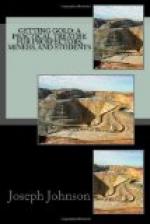What is the remedy for the unsatisfactory state of affairs we have experienced? The answer is a more practical system of working from the inception. Although it may evoke some difference of opinion I consider it both justifiable and desirable that the State should take some oversight of mining matters, at all events in the case of public Companies. It would be a salutary rule that the promoters of any mining undertaking should, before they are allowed to place it on the market, obtain and pay for the services of a competent Government Mining Inspector, who need not necessarily be a Government officer, but might, like licensed surveyors, be granted a certificate of competency either by a School of Mines or by some qualified Board of Examiners. The certificate of such Inspector that the property was as represented, should be given before the prospectus was issued. It is arguable whether even further oversight might not be properly be taken by the State and the report of a qualified officer be compulsory that the property was reasonably worth the value placed upon it in the prospectus.
Probably it will be contended that such restrictions would be an undue interference with private rights, and the old aphorism about a fool and his folly will be quoted. There are doubtless fools so infatuated that if they were brayed in a ten hundred-weight stamp-battery the “foolishness that had not departed from them” would give a highly payable percentage to the ton. Yet the State in other matters tries by numerous laws to protect such from their folly. A man may not sell a load of wood without the certificate from a licensed weighbridge or a loaf of bread without, if required, having to prove its weight; and we send those to gaol who practise on the credulity and cupidity of fools by means of the “confidence trick.” Why not, therefore, where interests which may be said to be national are involved, endeavour to ensure fair dealing?
Then with regard to the men who are to manage the mines, seeing that a man may not become captain or mate of a river steamboat without some certificate on competency, nor drive her engines before he has passed an examination to prove his fitness, surely it is not too much to say that the mine manager or engineer, to whose care are often confided the lives of hundreds of men, and the expenditure of thousands of pounds, should be required to obtain a recognised diploma to prove his qualifications. The examinations might be made comparatively easy at first, but afterwards, when by the establishment of Schools and Mines the facilities have been afforded for men to thoroughly qualify, the standard should be raised; and after a date to be fixed no man should be permitted to assume the charge of a mine or become one of its officers without a proper certificate of competency from some recognised School of Mines or Technical College. The effect of such a regulation would in a few years produce most beneficial results.




